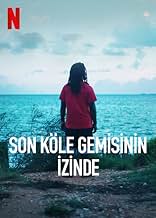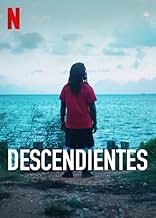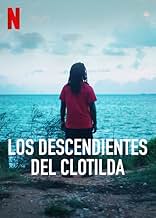IMDb-BEWERTUNG
7,1/10
1531
IHRE BEWERTUNG
Nachkommen versklavter Afrikaner*innen, die 1860 illegal auf einem Schiff in Alabama eintrafen, hoffen nach dem Fund des Wracks auf Gerechtigkeit und inneren Frieden.Nachkommen versklavter Afrikaner*innen, die 1860 illegal auf einem Schiff in Alabama eintrafen, hoffen nach dem Fund des Wracks auf Gerechtigkeit und inneren Frieden.Nachkommen versklavter Afrikaner*innen, die 1860 illegal auf einem Schiff in Alabama eintrafen, hoffen nach dem Fund des Wracks auf Gerechtigkeit und inneren Frieden.
- Regie
- Drehbuch
- Hauptbesetzung
- Auszeichnungen
- 7 Gewinne & 24 Nominierungen insgesamt
Empfohlene Bewertungen
Interviewing a bunch of relatives of slaves who just want reparation's for something their great great great grandparents went through. People they never met nor spoke to. Sad that the memory of the people who went through slavery has been reduced to this. The slaves remained strong through humility. They had Christ in their lives and God delivered a people who put their faith in Him. To try to capitalize on a situation like this by making a documentary based on the telephone game mentality of people who honestly are so far removed from the situation any testimony given will be self centric in nature is appalling. Should you ask Caucasian Americans with Italian decent about the roman empire? I think not.
If a person knew very little about slavery and the slave trade, this documentary would be a great shock and revelation. Since my earliest student days, however, the slave trade between Africa and the "Americas" stood high profile with me. It still does.
By focusing on the voyage of the "Clotilda", it being the last or one of the last slavers, and the descendance of its human cargo, it manages to cover the utterly dismal topic sufficiently. Grinning white people in suits referring to the reconstructive drawing of the "Clotilda" as "Wonderful" have no place in this story. This story belongs to African Americans, and how they were so late in history, abducted to the Americas by greedy white men.
These same men, and they were men, who now hold all the money and land from this outrage now are riding a gravy train of financial advantage. Overall, the abomination against humanity that was the entirety of the Africa-Americas slave business will remain a bleeding sore on our society until reparations are made. Now that would be a wonderful picture.
(Irving Warner)
By focusing on the voyage of the "Clotilda", it being the last or one of the last slavers, and the descendance of its human cargo, it manages to cover the utterly dismal topic sufficiently. Grinning white people in suits referring to the reconstructive drawing of the "Clotilda" as "Wonderful" have no place in this story. This story belongs to African Americans, and how they were so late in history, abducted to the Americas by greedy white men.
These same men, and they were men, who now hold all the money and land from this outrage now are riding a gravy train of financial advantage. Overall, the abomination against humanity that was the entirety of the Africa-Americas slave business will remain a bleeding sore on our society until reparations are made. Now that would be a wonderful picture.
(Irving Warner)
I've never heard of this - I've got no real expectations, but it doesn't exactly sound like a giggle.
It tells the story of the Clotilda/Clotilde (the spelling seems uncertain), a slave ship organised for a bet by a white landowner after slavery had been abolished. This brought 110 Africans to Alabama - and was then burned and sunk leaving no evidence it ever existed, except for a load of people who'd been threatened with lynching if they ever spoke about it. But they told their children, and their children's children, and - well, you get the idea! And now their 6x great-grandchildren are telling us their stories.
Unfortunately, because the ship was burned and sank, there's absolutely no physical evidence that any of this happened - so part of the film focusses on efforts to find the wreck, but when you look at a map of the Mobile river you can't help but feel their chances are somewhat limited (no spoilers as to whether they found it though!). And they also interview quite a few people that have no interest in finding it - as one lady puts it "how do I put this? I just don't care". But might she change her mind?
The film also considers other elements of the history of the community - it makes an interesting point that a lot of the surrounding land is used for heavy industry which has resulted in various health issues - and the land is owned by the descendants of the landowner that originally brought the slaves over, so history (once again) shows its nasty habit of repeating itself. And then talk turns to reparations...
What are reparations supposed to provide? Justice? Punishment? Closure? Whilst crimes can't be inherited by descendant, assets and hardship certainly can, so what value should be placed on them? If reparations are made, who do they go to? And given that the landowner's descendants have absolutely no interest in engaging in any dialogue, how could they even be possible?
The film certainly poses some interesting questions although it probably won't surprise you hear that it doesn't answer them - that's probably asking a bit too much from a 109 minute Netflix documentary. The film does manage to end on a positive note though - various people have hope for the future, whatever it might hold.
However, I also have to report that the interesting questions don't fill up a huge amount of those 109 minutes either - it's all very worthy, but unfortunately it's not exactly thrilling. It's most a lot of people just talking about stuff that means something to them but not a lot to anyone else or reading from a book. There's also a lot of repeated use of the same historical footage - it feels unfortunately like filler.
I feel a bit mean being nasty about what it obviously an important film for a lot of people - I know it never hurts for me to be educated in this stuff, but I'm afraid that just didn't really do it for me. It's diverting in places with some nice countryside (balanced by some very ugly urban scenes), but it's no more than that, I'm afraid. If, after that glowing recommendation, you still fancy watching it then it's on Netflix but there's much more interesting stuff on there.
It tells the story of the Clotilda/Clotilde (the spelling seems uncertain), a slave ship organised for a bet by a white landowner after slavery had been abolished. This brought 110 Africans to Alabama - and was then burned and sunk leaving no evidence it ever existed, except for a load of people who'd been threatened with lynching if they ever spoke about it. But they told their children, and their children's children, and - well, you get the idea! And now their 6x great-grandchildren are telling us their stories.
Unfortunately, because the ship was burned and sank, there's absolutely no physical evidence that any of this happened - so part of the film focusses on efforts to find the wreck, but when you look at a map of the Mobile river you can't help but feel their chances are somewhat limited (no spoilers as to whether they found it though!). And they also interview quite a few people that have no interest in finding it - as one lady puts it "how do I put this? I just don't care". But might she change her mind?
The film also considers other elements of the history of the community - it makes an interesting point that a lot of the surrounding land is used for heavy industry which has resulted in various health issues - and the land is owned by the descendants of the landowner that originally brought the slaves over, so history (once again) shows its nasty habit of repeating itself. And then talk turns to reparations...
What are reparations supposed to provide? Justice? Punishment? Closure? Whilst crimes can't be inherited by descendant, assets and hardship certainly can, so what value should be placed on them? If reparations are made, who do they go to? And given that the landowner's descendants have absolutely no interest in engaging in any dialogue, how could they even be possible?
The film certainly poses some interesting questions although it probably won't surprise you hear that it doesn't answer them - that's probably asking a bit too much from a 109 minute Netflix documentary. The film does manage to end on a positive note though - various people have hope for the future, whatever it might hold.
However, I also have to report that the interesting questions don't fill up a huge amount of those 109 minutes either - it's all very worthy, but unfortunately it's not exactly thrilling. It's most a lot of people just talking about stuff that means something to them but not a lot to anyone else or reading from a book. There's also a lot of repeated use of the same historical footage - it feels unfortunately like filler.
I feel a bit mean being nasty about what it obviously an important film for a lot of people - I know it never hurts for me to be educated in this stuff, but I'm afraid that just didn't really do it for me. It's diverting in places with some nice countryside (balanced by some very ugly urban scenes), but it's no more than that, I'm afraid. If, after that glowing recommendation, you still fancy watching it then it's on Netflix but there's much more interesting stuff on there.
This documentary is top notch. As anyone who has ever looked into their family history can tell you, the single most important resource genealogists have available to them is descendants. Many of us remember family stories passed to us from our parents & grandparents and many of those stories were passed to them by their parents & grandparents. In many cases the only historical records available are those stories passed generation to generation. The Christian Bible is a prime example of the importance of those stores passed thru the generations. The first Bible began taking shape about 600 years after the death of Christ so one can reasonably assess that the entire Christian Bible is based on stories passed down from generation to generation to generation. Is it possible that one, or more, of those story tellers might have exaggerated a bit? Probably - Just as the story of Lincoln scribbling the Gettysburg Address on the back of envelope isn't true. It is even possible the person documenting the story exaggerated for some reason - maybe even to make their story more appealing or even to satisfy a financial sponsor as with Washington's cherry tree story. In any case, the slaves brought over on the Clotilda deserve to be remembered and as with the Bible, each of us is free to determine what we believe.
I found this to be a fascinating documentary, that held my attention throughout.
That said, it left me with some unanswered questions, in part because of its format, which focused on interviews with people who lived in Africatown, near where the Clotilda, evidently the last slave ship to arrive in the United States, landed.
I can completely understand why the director and producer would want to give these people a chance to express their views and feelings. They had been ignored for so long.
And I know that documentaries can only be so long before viewers start to turn out and off.
But I would have liked more background about a variety of issues. Do we know anything about the Clotilda's route to the States? Do we know where in Africa it left from? Have any of the descendants taken DNA tests that would help with this?
What was life like for the descendants of the original slaves between the time of Emancipation and today?
And on and on.
None of that is a criticism of the movie, which I enjoyed very much. But because the story it told is so interesting, it left me wanting to know so much more.
That said, it left me with some unanswered questions, in part because of its format, which focused on interviews with people who lived in Africatown, near where the Clotilda, evidently the last slave ship to arrive in the United States, landed.
I can completely understand why the director and producer would want to give these people a chance to express their views and feelings. They had been ignored for so long.
And I know that documentaries can only be so long before viewers start to turn out and off.
But I would have liked more background about a variety of issues. Do we know anything about the Clotilda's route to the States? Do we know where in Africa it left from? Have any of the descendants taken DNA tests that would help with this?
What was life like for the descendants of the original slaves between the time of Emancipation and today?
And on and on.
None of that is a criticism of the movie, which I enjoyed very much. But because the story it told is so interesting, it left me wanting to know so much more.
Top-Auswahl
Melde dich zum Bewerten an und greife auf die Watchlist für personalisierte Empfehlungen zu.
- How long is Descendant?Powered by Alexa
Details
- Erscheinungsdatum
- Herkunftsland
- Offizieller Standort
- Sprache
- Auch bekannt als
- Descendant
- Drehorte
- Produktionsfirmen
- Weitere beteiligte Unternehmen bei IMDbPro anzeigen
- Laufzeit
- 1 Std. 49 Min.(109 min)
- Farbe
- Sound-Mix
Zu dieser Seite beitragen
Bearbeitung vorschlagen oder fehlenden Inhalt hinzufügen























